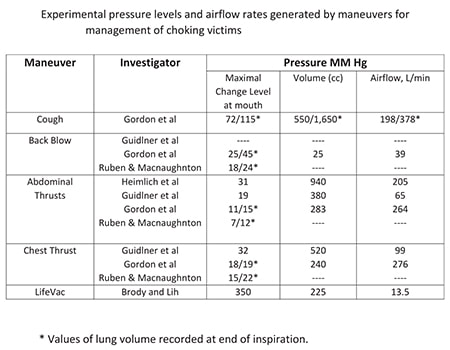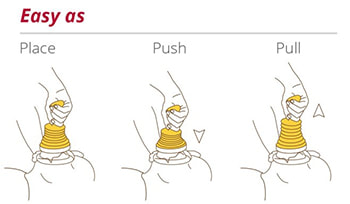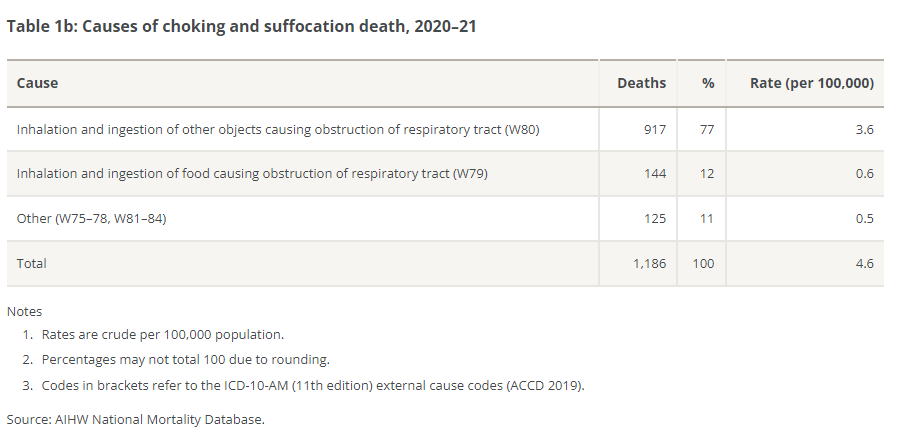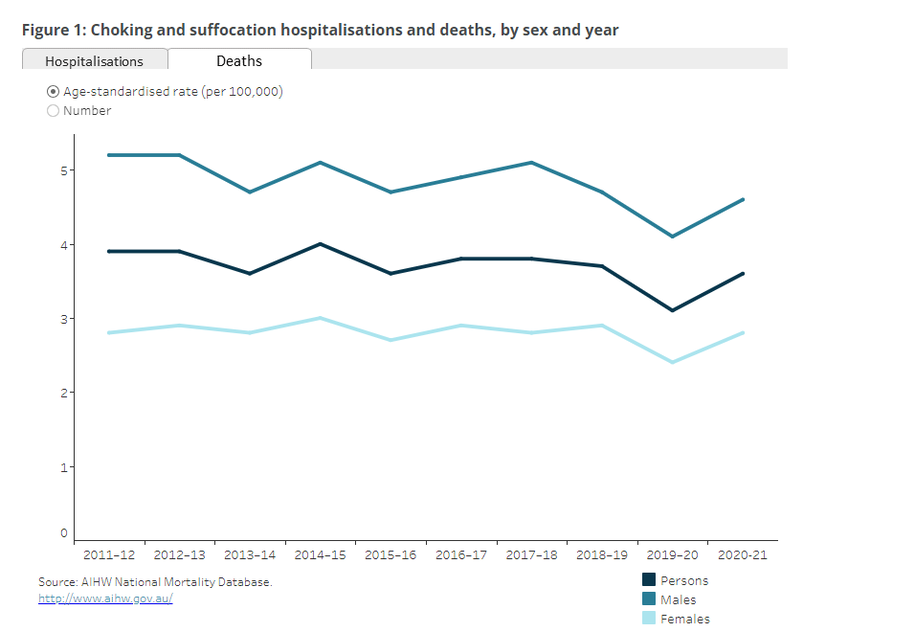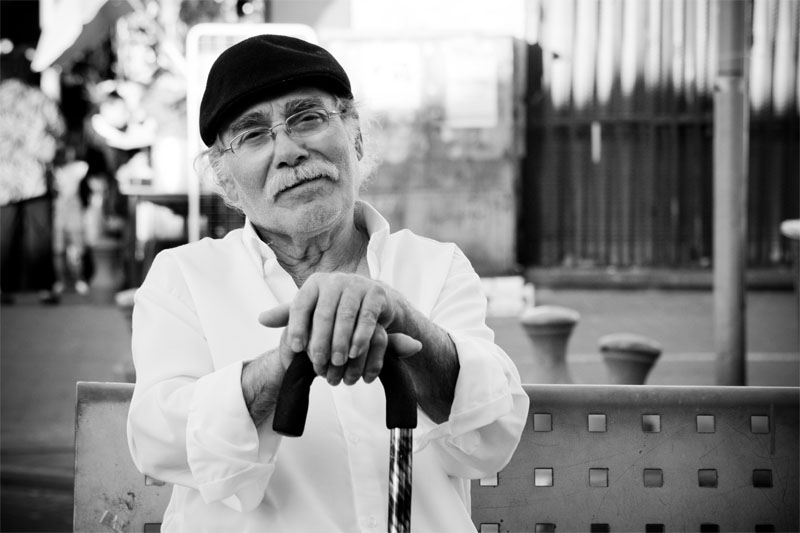The lifesaving anti-choking device for parents, carers, and professionals.
The vision of LifeVac came from Arthur Lih, founder and CEO of LifeVac, who heard a woman in a hospital weeping following the death of her young son, after choking on a simple grape.
The reason for this death was that the grape had become lodged in his windpipe and could not be dislodged. Once Arthur heard the story, he set out to invent an apparatus that could clear the airway of in the event of choking and save lives. Arthur, Dr Brody, and a few close friends, set out to bring LifeVac to the public by establishing a research and development facility located in Springfield Gardens, New York. Here they are producing this anti-choking device and sending it around the world. Their goal is to put a simple device into the hands of everyone, to save lives.
LifeVac Australia was established in 2016 to distribute this life saving technology in Australia.
The vision of LifeVac came from Arthur Lih, founder and CEO of LifeVac, who heard a woman in a hospital weeping following the death of her young son, after choking on a simple grape.
The reason for this death was that the grape had become lodged in his windpipe and could not be dislodged. Once Arthur heard the story, he set out to invent an apparatus that could clear the airway of in the event of choking and save lives. Arthur, Dr Brody, and a few close friends, set out to bring LifeVac to the public by establishing a research and development facility located in Springfield Gardens, New York. Here they are producing this anti-choking device and sending it around the world. Their goal is to put a simple device into the hands of everyone, to save lives.
LifeVac Australia was established in 2016 to distribute this life saving technology in Australia.
-
Unique
-
Effective
-
Innovative
-
Right for Australia
-
Easy to Use
<
>
The LifeVac is a unique device developed to address one specific problem, choking that is unrelieved by normal first aid methods. Unfortunately, a range of individuals are at risk from choking, including children, the elderly and those with a disability affecting their ability to swallow. It is the only device on the market that addresses this problem.
LifeVac is a unique . It’s a single use lifesaving apparatus (Single Use - Medical Device Class I) produced in the USA that has revolutionised, for the first time ever, the way choking is treated. LifeVac effectiveness, in removing an obstruction from a blocked airway, has been documented by various studies and proven to be more effective than even the best first aid measures.
|
LifeVac is designed with a patented one-way valve to prevent any air from exiting through the mask. This patented designed valve prevents air from pushing food or objects downward. This creates a one-way suction to remove the lodged food or object in the event of choking.
The negative pressure generated by the force of the suction is 3 times greater than the highest recorded first-aid measure. LifeVac generates over 300 mmHg of suction. The duration of suction is minimal so LifeVac is safe and effective. |
In Australia, choking deaths are a particular issue. Unlike the rest of the world, the first aid regime we are encouraged to use here to manage severe choking episodes (particularly choking in a conscious person using one handed chest thrusts) does not have any relevant clinical evidence or trials nor any recorded successes after more than 10 years on from its inception. This means we are especially in need of a device that can effectively relieve choking when current measures fail.
Choking is the second leading accidental cause of death in children under 14 years (11.1%) and the leading accidental cause of death in children under 1 year old (accounting for 40 child deaths annually). Choking is also the second leading cause of premature death in aged care in Australia.
Over 11 million Australians are particularly susceptible to choking due to pregnancy, age and/or profound disability, obesity, or being alone.
In 0-4 minutes of an obstruction blocking air, brain damage is possible. In 4-6 minutes brain damage is likely, and in 6-10 minutes brain damage is probable. In 10 minutes, there is probably brain death. The average Ambulance emergency response time is 8 to 15 minutes and longer in rural areas.
Choking on food accounts for more than half of choking admissions to hospital, closely followed by other objects. Of the recorded cases, the most common objects to cause obstructions in children are coins (19%), lollies (10%), meat (5%), nuts (3%), carrots (3%), toy and toy parts (3%)*. First Aid procedures do not guarantee the relief of choking. In Australia the regime recommended of poorly described "chest thrusts" has no documented evidence of success.
*Congiu, M., Cassell, E., & Clapperton, A. (2005). Unintentional asphyxia (choking, suffocation and strangulation) in children aged 0-14 years. Hazard, 60, 1-20.
https://www.aihw.gov.au/reports/injury/choking-and-suffocation
Over 11 million Australians are particularly susceptible to choking due to pregnancy, age and/or profound disability, obesity, or being alone.
In 0-4 minutes of an obstruction blocking air, brain damage is possible. In 4-6 minutes brain damage is likely, and in 6-10 minutes brain damage is probable. In 10 minutes, there is probably brain death. The average Ambulance emergency response time is 8 to 15 minutes and longer in rural areas.
Choking on food accounts for more than half of choking admissions to hospital, closely followed by other objects. Of the recorded cases, the most common objects to cause obstructions in children are coins (19%), lollies (10%), meat (5%), nuts (3%), carrots (3%), toy and toy parts (3%)*. First Aid procedures do not guarantee the relief of choking. In Australia the regime recommended of poorly described "chest thrusts" has no documented evidence of success.
*Congiu, M., Cassell, E., & Clapperton, A. (2005). Unintentional asphyxia (choking, suffocation and strangulation) in children aged 0-14 years. Hazard, 60, 1-20.
https://www.aihw.gov.au/reports/injury/choking-and-suffocation
What does the data say in Australia?
The government's Institute of Health and Welfare published data on choking and choking trends going up to 2022 and it shows the hospitalisation and deaths rates have not really varied over the proceeding years.
Source: Injury in Australia: Choking and suffocation. Australian Institute of Health and Welfare (DoHA) Last updated July 2023. https://www.aihw.gov.au/reports/injury/choking-and-suffocation
The government's Institute of Health and Welfare published data on choking and choking trends going up to 2022 and it shows the hospitalisation and deaths rates have not really varied over the proceeding years.
Source: Injury in Australia: Choking and suffocation. Australian Institute of Health and Welfare (DoHA) Last updated July 2023. https://www.aihw.gov.au/reports/injury/choking-and-suffocation
- Choking on objects is the most common cause of death in this category, while a foreign body in respiratory tract is the most common cause of hospitalised injury.
- Older people have the highest rates of death by choking and suffocation, while young children have the highest rates of hospitalisation.
- Inhalation or ingestion of an object other than food caused 77% of the deaths in this category in 2020- 21 as well as 23% of the hospitalisation in 2021-22. A foreign body causing respiratory tract injury caused a further 38% of the hospitalisation.
Over time the death-rate data has slight variations, given that there may be a significant delay between the time of the death and the determination by the Coroner of the cause of death e.g. several years. This means that there is a lag in the reporting and therefore difficult to interpret legacy trends.
Compared to all injury hospitalisations in 2021 22, for choking and suffocation:
Compared to all injury hospitalisations in 2021 22, for choking and suffocation:
- the average duration of a hospital stay was less than half as long
- the percentage of cases that included time in an ICU was about twice as high
- the percentage of cases that involved continuous ventilatory support was about 3 times as high
- the rate of in-hospital deaths was almost 4 times as high.
How LifeVac works
LifeVac is trusted
"As a Paramedic and CPR instructor with a swallowing disorder, I highly recommend LifeVac. Not only do I teach my students how to use the LifeVac (when other methods fail), I keep one in my home to give my family peace of mind; you should too. Using LifeVac is as simple as 1 - 2 - 3." - Rodney Millspaugh, Paramedic
A New Innovation to Save Lives and Provide Hope
for MS patients with Dysphagia
Both my mother and father live with MS in Sarasota, FL. My mother lives with primary progressive MS and my father was initially diagnosed with relapsing-remitting MS which has now progressed to secondary progressive MS . Despite the variances in their disease-related impairment and progression, they both share difficulties with swallowing, even early on post-diagnosis. My mom has experienced several episodes of choking and several months ago choked on a donut, turned blue, and fell unconscious. Despite many efforts, the several caregivers present at the time could not effectively perform first aid to relieve the obstruction. It took a large 6’4" Paramedic to slowly dislodged the food. She was approximately 30 seconds away from dying.
Luckily, she is doing well now, however based on her history of swallowing and choking issues coupled with the natural pulmonary decline in some MS patients, I am constantly faced with the anxiety that she will choke again, and will not survive. I share this story with you because I know that at various stages of MS, including early on in the course of the disease, dysphagia (difficulty swallowing), pulmonary dysfunction and muscle weakness arise. When these impairments occur early on most are unaware that there is a problem. Dysphagia may cause the individual to cough after drinking liquids, or choke when eating certain foods, especially those with a crumbly texture.
Whether you live with MS or are a caregiver for someone living with it you can empathise with the array of swallowing challenges and the subsequent psychological toll that it creates for all. Unfortunately, if the swallowing challenges turn into a choking episode there is a chance the individual may aspirate, or inhale fluid or solids into the upper respiratory tract and lungs, resulting in aspiration pneumonia. This condition can be serious, requiring treatment with antibiotics, or could even be fatal.
If you think back to my mother’s recent choking episode. The natural question is….Why so many unsuccessful first aid attempts and why did the food barely dislodge? Pulmonary compromise may be one of the main culprits and that is why I am so excited to learn about an apparatus that is specifically designed to save someone from choking. It’s called LifeVac.
The inventor and founder, Arthur Lih, created this product after hearing a story about the death of an 8 year-old boy after he had choked on a grape. He has professed, “How in this world of tremendous widespread innovation and achievement are we not able to save a child from dying on a grape!” It has become his mission to save as many lives, from this senseless type of death, as possible. The LifeVac is a hand powered single patient portable suction apparatus developed for resuscitating a choking victim when standard first aid procedures have been followed without success.
My anxiety level, along with that of my parents’ caregivers, about my parents’ risk of choking has been drastically reduced just since finding out about this apparatus. I can’t begin to express how critically important LifeVac will be not just for the MS population globally but for the relief of the psychological toll their dysphagia has on their family and caregivers.
There is now hope...
Luckily, she is doing well now, however based on her history of swallowing and choking issues coupled with the natural pulmonary decline in some MS patients, I am constantly faced with the anxiety that she will choke again, and will not survive. I share this story with you because I know that at various stages of MS, including early on in the course of the disease, dysphagia (difficulty swallowing), pulmonary dysfunction and muscle weakness arise. When these impairments occur early on most are unaware that there is a problem. Dysphagia may cause the individual to cough after drinking liquids, or choke when eating certain foods, especially those with a crumbly texture.
Whether you live with MS or are a caregiver for someone living with it you can empathise with the array of swallowing challenges and the subsequent psychological toll that it creates for all. Unfortunately, if the swallowing challenges turn into a choking episode there is a chance the individual may aspirate, or inhale fluid or solids into the upper respiratory tract and lungs, resulting in aspiration pneumonia. This condition can be serious, requiring treatment with antibiotics, or could even be fatal.
If you think back to my mother’s recent choking episode. The natural question is….Why so many unsuccessful first aid attempts and why did the food barely dislodge? Pulmonary compromise may be one of the main culprits and that is why I am so excited to learn about an apparatus that is specifically designed to save someone from choking. It’s called LifeVac.
The inventor and founder, Arthur Lih, created this product after hearing a story about the death of an 8 year-old boy after he had choked on a grape. He has professed, “How in this world of tremendous widespread innovation and achievement are we not able to save a child from dying on a grape!” It has become his mission to save as many lives, from this senseless type of death, as possible. The LifeVac is a hand powered single patient portable suction apparatus developed for resuscitating a choking victim when standard first aid procedures have been followed without success.
My anxiety level, along with that of my parents’ caregivers, about my parents’ risk of choking has been drastically reduced just since finding out about this apparatus. I can’t begin to express how critically important LifeVac will be not just for the MS population globally but for the relief of the psychological toll their dysphagia has on their family and caregivers.
There is now hope...
STILL NOT CONVINCED - SEE OUR FAQ SECTION


